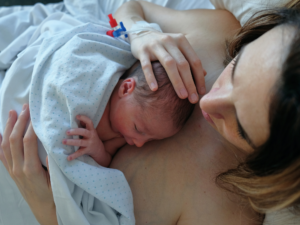Skin-To-Skin/Kangaroo Care
 Infants are born “hardwired” with strong needs to be nurtured and to remain physically close to the primary caregiver, usually the mother, during the first few years of life. This is important for the child’s emotional, physical, and neurological development.
Infants are born “hardwired” with strong needs to be nurtured and to remain physically close to the primary caregiver, usually the mother, during the first few years of life. This is important for the child’s emotional, physical, and neurological development.
“Skin-to-skin care” means your naked baby is placed face down, directly on your bare chest immediately after birth.
All healthy babies should remain skin-to-skin for at least an hour or until after the first feeding at the breast. A blanket covering and your body heat will keep you both warm.
Skin-to-skin infant care:
- Satisfies baby’s natural craving to be close to you.
- Steadies baby’s temperature, breathing, heart rate, and blood sugar.
- Calms baby and reduces crying.
- Reduces stress in mom and baby.
- Encourages bonding between mom and baby.
- Promotes better breastfeeding.
- Allows mom to learn baby’s cues for feeding.
- Helps mom recover after childbirth.
Your baby will feel your warmth, comfort, and love because the sounds and smells are familiar and different from others around you.
During the first hour after birth, your baby is usually alert and they may be eager to suckle. This position is ideal for breastfeeding and reassuring a child who is feeling unwell.
Skin-to-skin care increases a mother’s oxytocin levels, which helps to prevent postpartum hemorrhage. Oxytocin or the “love hormone” affects mom’s brain chemistry, resulting in more “mothering” behaviors and confidence. Skin-to-skin care is a way for moms to enjoy quiet, unrushed time with a new baby.
Skin-to-skin infant care is not only for the baby born at term and in good health but also for low birth weight and pre-term babies. Premature babies benefit from continuous contact called Kangaroo Care, which involves almost constant skin-to-skin holding. Carrying, or babywearing using a soft carrier, gives a baby physical contact, comfort, security, stimulation, and movement.
Fathers can also provide skin-to-skin care. Older babies and children love skin-to-skin contact, especially when they are fussy, colicky, not feeling well, or tired.
Services related to this information:
- Contact your Public Health Nurse
- 811 HealthLine (Newfoundland & Labrador) – Call 811 or 1-888-709-2929 / TTY 1-888-709-3555

